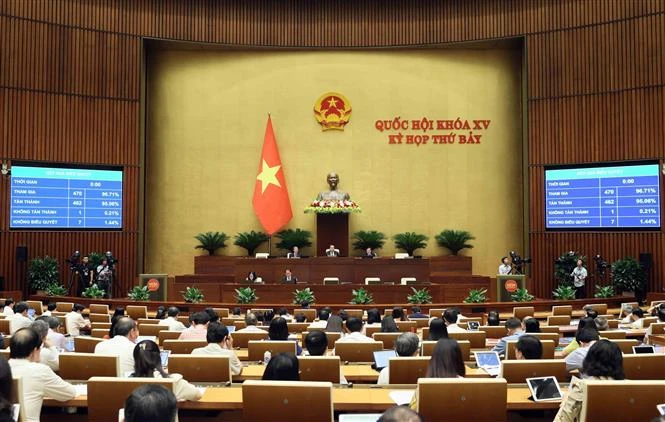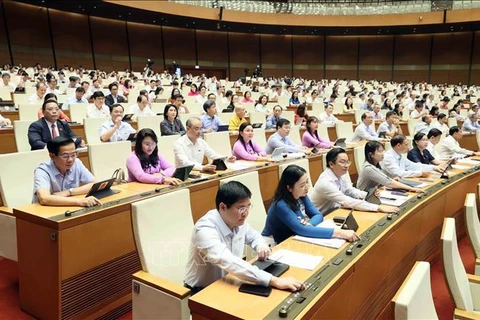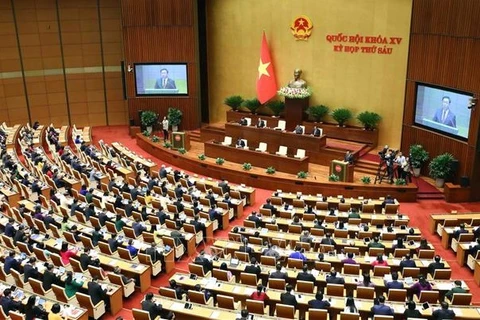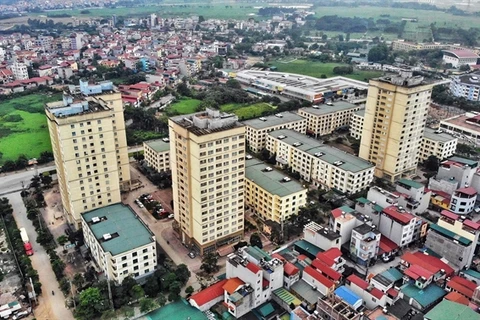
Hanoi, (VNA) – National Assembly deputies are optimistic that with the Capital Law (revised) which was adopted on June 28, obstacles to Hanoi’s development, particularly those related to institutions, will be removed, creating new development spaces for the capital city.
Tran Hoang Ngan, a deputy of Ho Chi Minh City, said the newly-approved law inherits the quintessence of the earlier version, while updating and supplementing new issues regarding the delegation and decentralisation of authority for the capital city’s leadership, administration and people.
According to Ngan, the revised law will create favourable conditions for Hanoi, with a thousand-year-old history, to preserve the national cultural identity and at the same time have more space for development. The city will be able to expand to four directions in the capital city region, thus reducing congestion in the city while keeping its unique beauty that appeals to international travellers.
Deputy Bui Hoai Son of Hanoi held that current legal frameworks are no longer suitable for the development trend of the country, which requires the Capital Law to be revised to create a more appropriate and conducive legal corridor for not only Hanoi but also the country as a whole.
Son particularly highlighted the regulations on cultural development in the law, noting that besides Article 25 dedicated to cultural issues, there are also regulations on cultural industrial parks and innovative spaces in other articles.
“I highly appreciate stipulations on the development of the cultural industry in Hanoi,” he said.
He stressed that Hanoi pays great attention to developing the cultural industry, citing the municipal Party Committee’s Resolution 09 on this issue. According to him, stipulations in the new Capital Law will facilitiate the implementation of the resolution.
Truong Xuan Cu, a deputy of Hanoi, said one of the key issues in the Capital Law is the legalisation of mechanisms and policies to turn the city into the political, economic and cultural centre of the country.
The law also legalises the decentralisation and delegation of power to administrative authorities at all levels in Hanoi, from municipal to district and ward, thus allowing local Party committees and administrations to fully tap into local potential and advantages.
According to Cu, Hanoi has been one of the localities successfully attracting talents and scientists. Noting that the city has favourable conditions to draw talents, he urges Hanoi to continue issuing policies designed specifically to attract talents. “The intellectuals play an important role, even a decisive role in the capital city’s development,” he said.
The deputy also pointed to Hanoi’s advantages in drawing investment, and suggested that the city renew investment attraction mechanisms and policies.
The National Assembly passed the Capital Law (revised) with the approval of 462 out of 470 participating deputies on June 28 morning during its seventh session. The revised law, which will take effect from January 1 next year, consists of seven chapters with 54 articles, clearly defining the position and role of the capital city; policies and responsibilities for construction, development, management, and protection of the capital./.






















